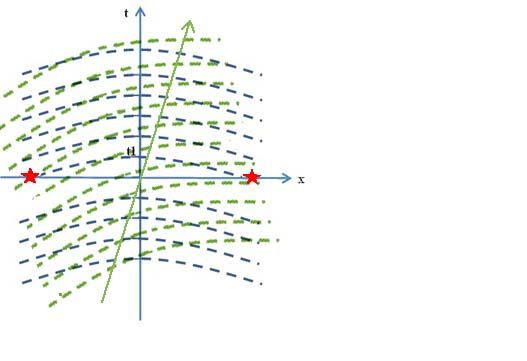twistor59 wrote:Yes we can, but only because we have a God's eye view of the universe, which, in this case is Minkowski space.
The key point is that
you couldn't use a fact like "A is in the past of t1" as an ingredient of any physical law, because it's completely arbitrary.
What I mean is that assigning times to events (events are real physical things like a flash of light, or an atom decaying) by using spatial slices like this:
past.jpg
then event A - a real physical event like a flash of light - lies to the past of time t1.
But if I assign times to events by using spatial slices like this:
future.jpg
then the same physical event A now lies to the future of t1. Note, although the lines are curved, this is still flat Minkowski space, not curved spacetime.
Physical laws can't be expressed in such a way that they depend on assigning time coordinates to remote events like we do in the first diagram, because the first diagram's assignment is entirely arbitrary, the second diagram's assignment is just as good. But then there is no distinction between past and future for these remote events (which lie outside dude's light cones). The only distinction would be for a godlike figure who had visibility of the whole of Minkowski space. And even then the disinction would depend on how he or she decided to set up the time coordinates. These coordinates are not physical.
That's why if you look at Einstein's early work he drones on and on about formulating physical laws in a manner that they behave in a nice controlled way when you change the coordinates.
There is a fundamental issue when we talk about assigning time co-ordinates to events, because in doing so it forces us to take a philosophical position on the nature of time; that is, for those co-ordinates to be meaningful, we must take a certain position on the nature of time.
We can avoid that potential minefield, howerver, by not talking about time co-ordinates at all. Firstly, we can start off with the idea that all that exists in the universe is us; that is, for me, the universe consists only of me, or for you, the universe consists only of you. That might be a solipsist position, but it isn't one that we have to stick to. So, if the universe consists only of me - meaning that what I see as distant planets, galaxies etc. is just a figment of my imaginations - if I am the universe (for you, you are the universe and I don't exist) and I say "now", then, to all intents and purposes we don't have any problems with the idea of simultaneity of distant events. The present moment is all there is for us, and therefore all there is, so "now" is all that exists.
However, if we allow that the universe consists of more than just us, which I think is somewhat reasonable, then we are commited to the idea that there are parts of the universe which are spatially separated from us. If we allow that, in these spatially separated parts of the universe, events occur, then we can reasonably deduce that when we say "now" there are events which are simutlaneous with that in distant parts of the universe - the only other option is if there are no events spatially separated from us, or that no part of the universe exists which is spatially separated from us.
When we establish this fact, that there are spatially separated events which are simultaneous with our "now", we can proceed using the idea that light propagates at a finite speed. If there are events in the universe, which are spatially separated from us and which are simultaneous with our "now", and light propagates at a finite speed from those events, then we reason that when light from those events reach us, in what we would term "a now after the original", those events that were simultaneous with the original "now" must, by necessity, be in our past.
CausalityI think what you are successfully demonstrating is that an event cannot have a causal influence on our present, until light from that event reaches us, in our present; but the event that was the emission of the light, is a different, but connected, event from the event of the light reaching us. This is where the past light cone comes in, I think. But, events can be in our past even if they haven't had a causal influence on us yet; it just means they won't make up part of the sensory experience that we call the past.
The issue arises, I think, when we start trying to determine which events are simultaneous with our "now"; but we can reason that, by the time light from spatially separated events reaches us, the events from which they traveled must, by necessity be in our past; even if they hadn't had a causal influence yet.
That is one of the benefits of abstract reasoning, as you maybe allude to, that we can take a "gods eye view" of the universe.
Do not mistake understanding for realization, and do not mistake realization for liberation
- Tibetan Buddhist Saying




